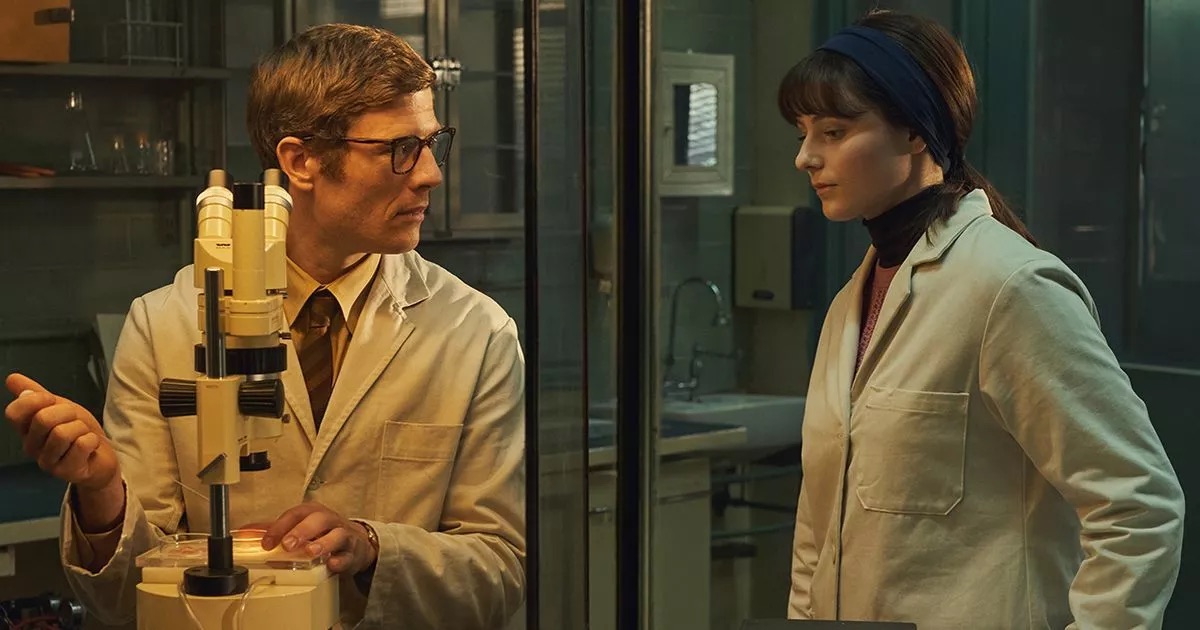There is no happiness on this Earth more primal or profound than having a baby, and yet the expectation to do so has forever been wielded against women as a misery; it’s been a cross to bear for the people who get pregnant, a pariah-level sin for the people who choose not to, and — perhaps most unfairly of all — a curse from God for the people who can’t.
I trust you’re not hearing about this for the first time in a review of a pleasantly forgettable Netflix film starring Bill Nighy, but the fact remains that “society” has been content with that arrangement for much of the last few millennia, and science’s best efforts to amend it have invariably been met with scorn. Indeed, the work of developing in vitro fertilization was so controversial that it had to be hidden from the church and the tabloids alike.
What if some of the people who can’t get pregnant… actually can? The central question of IVF has been answered by more than 12 million healthy children since 1968, and yet it’s still “up for debate” in the political sphere. While Ben Taylor’s “Joy” does what it can to tease some light suspense from the story of asking that question for the first time, this simple, upbeat, and gently staid historical drama about that process — named after the first baby born from it — mercifully doesn’t get too caught up in the “will they?” or “should they?” of it all. They did, and thank God for that.
Instead, Jack Thorne’s antiseptic script — despite adhering to genre convention like a doctor to the Hippocratic Oath — prefers to focus on why three very different Brits were compelled to break away from established thinking despite the enormous toll that doing so took on their personal lives and, to a lesser extent, why their patients were inspired to follow in kind. In other words, the rewards of IVF are so obvious that Thorne could only hope to mine drama from the risks of pursuing them. And so the most basic questions about the procedure are nominally replaced by a host of more interesting ones that play on the lower-case implications of “Joy”’s title. Questions like “what is the cost of happiness?,” “where does it come from?,” and “how do people learn to find it when it doesn’t look the way they always imagined that it would?”
Which is to say that Louise Joy Brown and her mother are almost like afterthoughts in this movie — glorified extras who emerge at random toward the very end. Instead, the motley crew of main characters here starts with Dr. Robert Edwards (a charismatic and convincing James Norton), whose IVF trials at Cambridge are still in the embryonic stage when we first meet him there in May 1968. Even if we didn’t already know that his efforts will ultimately be successful, Steven Price’s light and buoyant score would be enough to put anyone at ease, while the blunt smattering of period-appropriate needle drops — starting with Nina Simone’s cover of “Here Comes the Sun” — scream coziness so loud that it almost feels aggressive.
So too does Thomasin McKenzie’s casting as Jean Purdy, the mousy nurse who stumbles into a job at Robert’s lab after she captures one of the mice he’s been nursing. Radiating a decidedly old-fashioned aura, McKenzie has excelled in a variety of period pieces that play on her innocence (last year’s “Eileen” comes to mind). Here, the actor’s soft-spoken stoicism allows her to seize upon Jean’s duality as a devoutly Catholic free spirit whose faith in Jesus — and love for her even more pious mother (Joanna Scanlon) — is only outmatched by her moral independence. “If I hear a commotion, I’m not very good at staying out of it,” Jean says, as McKenzie somehow manages to squeeze a few drops of truth out of dialogue so tin-eared it sounds like a “Real Housewives of New York” character introduction. When the similarly forthright Robert tells her that he’s “going to cure childlessness,” Jean doesn’t hesitate to join the cause.
In order for these science types to progress with their experiments, they need the help of an OBGYN. Enter: The rather over it Patrick Steptoe (Nighy on auto-pilot, not that anyone would complain), who’s been laughed into the margins of the medical community for bogus reasons, and therefore in reluctant need of a new project. While Robert remains something of a handsome cipher, motivated only by his sincere belief in what science can accomplish, Patrick and Jean each have their own secret reasons for wanting to conquer infertility — the kind of backstories that bubble up to the surface during a vulnerable moment in the second act, only to then get buried again by the rising tides of plot.
Most of the plot in “Joy” follows these three as they chip away at turning theory into practice, a process that involves scrambling from one facility to the next as they’re mocked — or worse — by medical councils, talk show audiences, and the “Frankenstein” graffiti that’s sprayed outside of their lab. Thorne’s script never quite manages to split the difference between emotional stakes and scientific jargon, but it’s simple enough to understand that Robert’s team is making baby steps (sorry) toward success, and their progress is made legible by the growing ranks of trial patients who eventually come to dub themselves “The Ovum Club.”

“Joy” only makes a glancing attempt to articulate how difficult it must have been for these women to re-engage with the hope they’d already lost, and to do so before a single child had ever been conceived through in vitro fertilization, but the film takes pains to convey how the failure of these trials might pave the way for future success. While most of these women will never give birth to a baby of their own, there’s a profound solace to the idea that their efforts might conceive of generations to come.
In lieu of getting to know the members of the Ovum Club, “Joy” nominates Jean as an avatar for their second-hand satisfaction, which in turn makes her the de facto protagonist of a movie that never seems fully comfortable with that arrangement. The framing device’s effort to rescue Jean from the footnotes of history is so half-assed that it almost feels like a backhanded compliment, and the scenes that try to poke fun at her incongruously clinical bedside manner are even worse (think Richard Curtis tones matched with Yorgos Lanthimos dialogue). Nevertheless, she’s certainly the most well-realized character of the group, and her choice to partner with Robert — at the expense of her relationship to her mother and their church community — resonates with the liberties and complications of reproductive rights, especially when her work on in vitro comes into conflict with her position on abortion.
But Jean doesn’t do a lot of cinematically actionable things over the course of this story, and so her journey from manic pixie dream nurse to historic embryologist is mostly charted by the fulfillment she notices in the women around her. In a haphazardly structured film that sputters forward in time with all the flow of scientific progress, Jean’s emergent sense of feeling — her growing appreciation for what it means for women to have as much control over their bodies as biology will allow — is the only consistent through-line.
“Joy” is way too milquetoast to mine that awakening for any real nuance, as the movie’s trailblazing spirit is offset by the formulaic nature of its design, and yet neither the deficiencies of Thorne’s script nor the made-for-TV feeling of Taylor’s direction ever fully obscure the enduringly relevant principle they exist to serve: Science will always keep inching forward, but it’s society’s job to ensure that bringing life into this world is a happiness worth the heartache of living in it.
Grade: B-
“Joy” will be available to stream on Netflix starting Friday, November 22.
Want to stay up to date on IndieWire’s film reviews and critical thoughts? Subscribe here to our newly launched newsletter, In Review by David Ehrlich, in which our Chief Film Critic and Head Reviews Editor rounds up the best new reviews and streaming picks along with some exclusive musings — all only available to subscribers.






